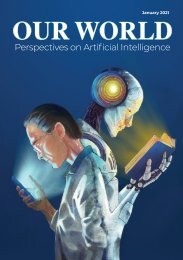Our World in 2018
Leading minds reflect on the state of our societies, and examine the challenges that lie ahead. An edition dedicated to generating ideas that will help form a new vision for our world.
Leading minds reflect on the state of our societies, and examine the challenges that lie ahead. An edition dedicated to generating ideas that will help form a new vision for our world.
Create successful ePaper yourself
Turn your PDF publications into a flip-book with our unique Google optimized e-Paper software.
In Syria, the World’s
Democracies Failed Us
By Fadi Azzam
Umar ibn al-Khattab, a chief adviser
and successor to the Prophet
Muhammad, was the last truly just
ruler in the Arab world, and he died 1,400
years ago. Khattab was called “al-Farooq”
— the one who distinguishes between right
and wrong.
He also uttered one of the most beautiful
phrases in Arab history: “How can you turn
people into slaves when their mothers gave
birth to them as free human beings?”
Khattab extended the Islamic empire
as far as Persia and was renowned for
establishing evenhanded governance
throughout the conquered lands, including
in what is now Syria. Damascus is a pivot
point for understanding history and its
movements. Conquered countless times,
the city has always managed to remain
steadfastly itself when its occupiers change.
During the last century, Damascus
established many of the essentials of
democracy: elections, a parliament, political
parties, anti-government protests, freedom
of the press.
Then came the Baath Party coup in 1963.
Hafez al-Assad snatched freedom and
instituted a paranoid regime. In 2000 his
son Bashar succeeded him, and promised
.
movement stalled.
In March 2011, in the midst of the Arab
Spring, protesters took to the streets of
Damascus, demanding democratic reforms
and the release of political prisoners.
Security forces opened fire — and a
revolution began, gradually convulsing all
of Syria.
In a video from that time, President
Bashar al-Assad’s soldiers trampled a group
Fadi Azzam
Fadi Azzam is a
Syrian writer and the
author of the novel,
“Sharmada”.
of young protesters shackled in chains
on the ground: You want freedom, you
animals? Tell me: What is freedom? That
was the question. And the Assad regime
responded decisively.
Meanwhile, in an area of Syria seized by
Al Qaeda, a video camera documented how
foreign fighters from Chechnya, France,
Saudi Arabia and Tunisia were terrorizing
the young people of the Syrian revolution,
tearing down their flag. Then Al Qaeda
posted signs on the roads under its control:
“Democracy Is Blasphemy.”
The Syrian tragedy came to dominate
screens worldwide. And the question for
Arab nations was clear: Do you understand
the fate of those who demand freedom
and democracy? This question, which was
answered with Syrian blood, confirmed
that this dreadful Arab Spring must end in
Damascus.
A
intervention mainly to words, as if
statements alone would counter the
Assad regime’s brutality and the hatefulness
of the imported terrorists. In our time,
terrorism has emerged as an effective
prescription for treating all diseases —
a postmodern sorcery that has opened
Syria’s doors to thousands of jihadis from
around the world.
Once in Syria, these bearded men drove
tanks and fired machine guns, applying
what they had learned from playing video
games. Fantasy blended with fact so that
the two were hard to separate.
As terrorists streamed in and Syria
erupted, the free world kept a safe
distance. In 2014, President Barack Obama,
defending the West’s lack of significant
military intervention, questioned whether
the “moderate opposition” in Syria — which
included “farmers or dentists or maybe
some radio reporters” — could ever prevail
against “a battle-hardened regime, with
support from external actors who have a
lot at stake.”
But if a Syrian dentist says to the world,
in effect, “You have bad breath,” what’s
wrong with that?
160 2018 | OUR WORLD










